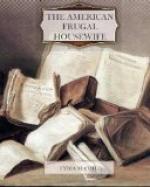Dyspepsia Bread.—The American Farmer publishes the following receipt for making bread, which has proved highly salutary to persons afflicted with that complaint, viz:—Three quarts unbolted wheat meal; one quart soft water, warm, but not hot; one gill of fresh yeast; one gill of molasses, or not, as may suit the taste; one tea-spoonful of saleratus.
This will make two loaves, and should remain in the oven at least one hour; and when taken out, placed where they will cool gradually. Dyspepsia crackers can be made with unbolted flour, water and saleratus.
To make Rice Bread.—Boil a pint of rice soft; add a pint of leaven; then, three quarts of the flour; put it to rise in a tin or earthen vessel until it has risen sufficiently; divide it into three parts; then bake it as other bread, and you will have three large loaves.
Heating ovens must be regulated by experience and observation. There is a difference in wood in giving out heat; there is a great difference in the construction of ovens; and when an oven is extremely cold, either on account of the weather, or want of use, it must be heated more. Economical people heat ovens with pine wood, fagots, brush, and such light stuff. If you have none but hard wood, you must remember that it makes very hot coals, and therefore less of it will answer. A smart fire for an hour and a half is a general rule for common sized family ovens, provided brown bread and beans are to be baked. An hour is long enough to heat an oven for flour bread. Pies bear about as much heat as flour bread: pumpkin pies will bear more. If you are afraid your oven is too hot, throw in a little flour, and shut it up for a minute. If it scorches black immediately, the heat is too furious; if it merely browns, it is right. Some people wet an old broom two or three times, and turn it round near the top of die oven till it dries; this prevents pies and cake from scorching on the top. When you go into a new house, heat your oven two or three times, to get it seasoned, before you use it. After the wood is burned, rake the coals over the bottom of the oven, and let them lie a few minutes.
Those who make their own bread should make yeast too. When bread is nearly out, always think whether yeast is in readiness; for it takes a day and night to prepare it. One handful of hops, with two or three handsful of malt and rye bran, should be boiled fifteen or twenty minutes, in two quarts of water, then strained, hung on to boil again, and thickened with half a pint of rye and water stirred up quite thick, and a little molasses; boil it a minute or two, and then take it off to cool. When just about lukewarm, put in a cupful of good lively yeast, and set it in a cool place in summer, and warm place in winter. If it is too warm when you put in the old yeast, all the spirit will be killed.
In summer, yeast sours easily; therefore make but little at a time. Bottle it when it gets well a working; it keeps better when the air is corked out. If you find it acid, but still spirited, put a little pearlash to it, as you use it; but by no means put it into your bread unless it foams up bright and lively as soon as the pearlash mixes with it. Never keep yeast in tin; it destroys its life.




